At Least 45 Iranians Were Executed In Past Month, One In Public
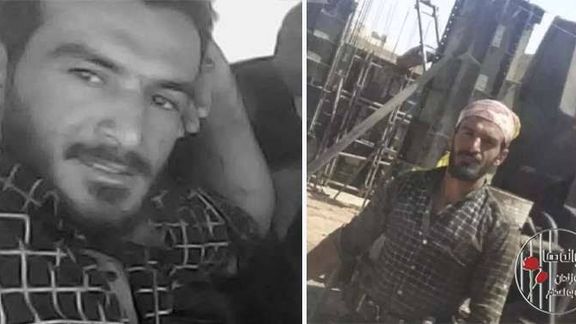
At least 45 people were executed in Iran during the previous month, and a political prisoner also received a death sentence.

At least 45 people were executed in Iran during the previous month, and a political prisoner also received a death sentence.
According to a report by the United States-based Human Rights Activists' News Agency (HRANA) on Saturday, the executions were carried out in several prisons across Iran, including Gohardasht Prison – also known as Rajai-Shahr in Karaj, Borujerd, Birjand, Yazd, and Esfahan.
In Rajai-Shahr prison, at least 18 prisoners were executed, 10 in one day before another eight a week earlier.
The report added that a political prisoner in Orumiyeh (Urmia) prison, identified as Shaker Behrouz, was sentenced to death by Branch 1 of the city’s Revolutionary Court and several other prisoners, including a woman, were also sentenced to death on charges of murder.
In addition to the 45, Iran on Saturday carried out its first public execution in over two years in an eye-for-eye move, called ‘qisas’ according to Quranic principles. Iman Sabzikar, who had been convicted over the murder of a police officer in February 2022 in the southern city of Shiraz, was hanged in the early morning at the scene of the crime.
On June 16, UN Secretary General António Guterres released a report on the situation of human rights in Iran, decrying “the high number of death penalty sentences and executions” and “reports of death in prison due to denial of adequate and timely medical care.”
The UN chief said that the number of executions in Iran increased from at least 260 cases in 2020 to 310 individuals in 2021, and the number continued to rise into 2022.

If NATO wins in Ukraine, Iran would be its next target, the hardline Kayhan wrote Sunday, reinforcing Tehran’s support for Russia and calling for "pre-emptive defense."
Kayhan’s strong endorsement of Ali Khamenei’s support for Putin during their meeting in Tehran on July 20, was coupled with an editorial in the Revolutionary Guard Javan newspaper Sunday. Javan spoke of “pre-emptive legitimate defense”, without naming Ukraine, but in the context of defeating the West.
Javan argued that when Muslims are endangered it is legitimate to strike pre-emptively and side even with a “despotic ruler”, although it clarified that Putin is not such a leader.
The Kayhan and Javan editorials signal an attempt to justify Iran siding with Russia in the Ukraine war, by offering military assistance, by raising the far-fetched “pre-emptive legitimate defense” argument when neither Russia nor Ukraine have borders with Iran.
The Kayhan editorial was written by its ultra-hardliner editor Hossein Shariatmadari, who enjoys the title of Khemeni’s representative at the flagship conservative newspaper and is seen as reflecting the views of the Supreme Leader.
Shariatmadari described Khamenei’s praise for Putin’s “initiative” to attack Ukraine as “a serious warning to America and its allies” who “are playing with the lion’s tail.” He also wrote that “Iran is one of the next main targets” of NATO, if the Western alliance wins in Ukraine, which would justify a preemptive reaction.

Khamenei also told Putin in Tehran that if the Russian ruler had not taken the initiative, NATO was preparing to start a war in Ukraine in any case.
When the Russian invasion of Ukraine started in February, Iran tried to exhibit neutrality, calling for an end to hostilities, but blaming the West for triggering the war by expanding NATO.
At the same time the 11-month-long negotiations in Vienna to revive the 2015 nuclear deal, JCPOA, came to a halt less than two weeks after the invasion and Tehran has since refused to accept an offer the West had made in December, insisting on more demands that Washington considers “extraneous” to the nuclear issue.
In mid-July the United States warned that Russia was preparing to acquire military drones from Iran to use in the war. A few days later Putin traveled to Tehran, where Khamenei clearly sided with the Kremlin on the Ukraine issue.
Shariatmadari insisted that the Islamic Republic “considers Russia’s confrontation with America and NATO in Ukraine as part of its own security and logically and naturally will support it.”
Javan argued that Iran “is pursuing legitimate pre-emptive defense” and will spare no efforts in neutralizing “the enemy’s evil plans” and weaken Western “hegemony and the establishment of a new world order.”
The invasion of Ukraine and Russia’s confrontation with the West fits perfectly with Khamenei’s anti-Western ideology that has determined Iran’s foreign policy for more than three decades. The United States is often labeled as “World arrogance” by Khamenei and his supporters who have rejoiced at any sign of Chinese-US or Russian-US tensions.
Khamenei in his speeches has constantly called for a tilt toward the East, as Iran’s best strategic path, praising relations with Moscow and Beijing, although both sided with the West in early 2010s to limit Tehran’s nuclear program.
The pro-Russia foreign policy has been criticized by former politicians and pundits in Tehran, who often cite the Islamic Republic’s original motto of “Neither East nor West.”
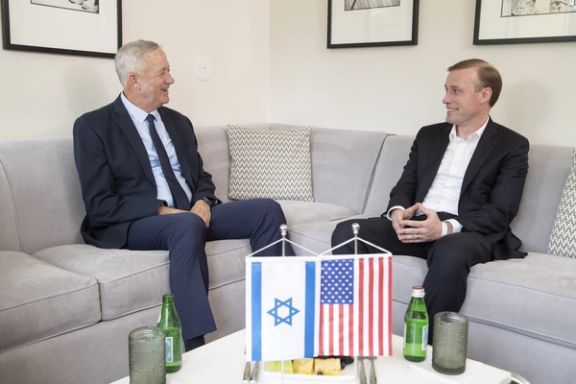
Israeli Defense Minister Benny Gantz met with US National Security Advisor Jake Sullivan to discuss deepening bilateral defense cooperation in face of the Iranian threat.
The two held a meeting on the sidelines of the Aspen Security Forum on Friday, where they also discussed President Joe Biden’s visit to Israel and Saudi Arabia and its effects on ways to strengthen regional cooperation.
“We discussed the growing threat posed by Iran to the world, the region and to the State of Israel via its nuclear program and growing aggression via proxies, maritime activities, cyberattacks and more, and ways to create a united front against the region’s biggest destabilizer,” Gantz tweeted.
Gantz also held separate meetings with former US secretary of state Condoleezza Rice, former secretary of defense Mark Esper, and Iowa’s Republican Senator Joni Ernst.
In an interview during the Aspen forum, Gantz noted that war with Iran was the least desired option, saying, “Should we jump to a war at the first opportunity we have? No. Should we be able to conduct military operations to prevent it [a nuclear Iran] if needed, the answer is ‘yes.’ Are we building the ability [for war]? Yes. Should we use it as a last case? Yes – and I hope that we will get US support.”
During Biden’s trip, the Jerusalem US-Israel Strategic Partnership Joint Declaration was issued in which Washington reaffirmed its commitment “never to allow Iran to acquire a nuclear weapon” and promised that “Israel had a right to defend itself by itself.”
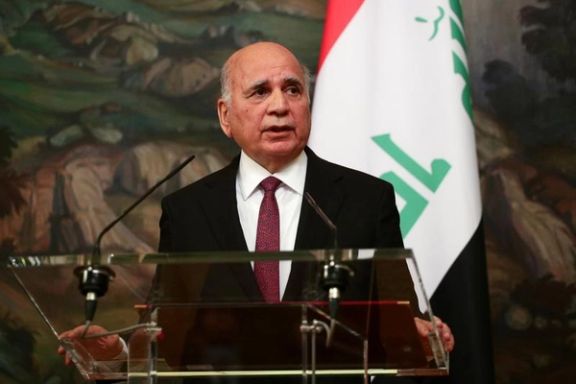
Saudi Arabia and Iran have reportedly agreed to hold the first public meeting at the level of foreign ministers in Baghdad following rounds of closed reconciliation meetings.
Iraqi Foreign Minister Fuad Hussein told Erbil-based media network Rudaw on Saturday that Baghdad hosted five rounds of talks between Tehran and Riyadh “between intelligence and security officials,” adding that this upcoming round of negotiations will be public.
He did not elaborate when the meeting will take place, adding that “The Saudi crown prince asked us to host the meeting of the Saudi foreign minister with his Iranian counterpart in Baghdad.”
On July 21, Iran's Foreign Minister Hossein Amir-Abdollahian said Saudi Arabia has shown readiness to advance the bilateral talks from security issues to the political phase. "Last week we received a message from Iraqi foreign minister [Fuad Hussein] saying that the Saudi side is ready to move the talks from a security phase to a political and public one.”
"We also expressed our readiness to continue talks at the political level so that it leads to the return of Iran-Saudi Arabia ties to the normal level," he added.
Late in June, Iraqi Prime Minister Mustafa al-Kadhimi traveled to Iran and met with President Ebrahim Raisi after a visit to Saudi Arabia and meeting with the kingdom’s de facto ruler Crown Prince Mohammed bin Salman aimed at jumpstarting stalled talks between Tehran and Riyadh.
Saudi Arabia cut ties with Iran in 2016 when mobs attacked its embassy in Tehran after Riyadh executed 47 dissidents including the leading Shiite cleric Sheikh Nimr al-Nimr.
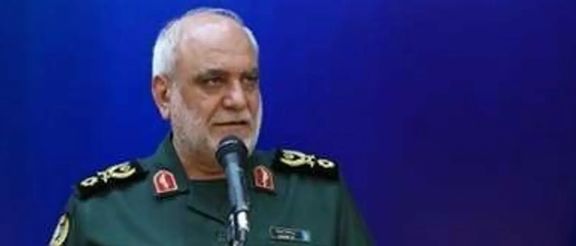
Iran claimed on Saturday that it had arrested all members of a sabotage team sent by Israel through the Iraqi border, following months of mysterious attacks.
A short announcement from the Intelligence Ministry said, “A network from the spy agency of the Zionist regime who were sent to the country for terrorist operations” were identified and arrested.
"This network's members were in contact with (Israel's) Mossad spy agency through a neighbouring country and entered Iran from (Iraq's) Kurdistan region with advanced equipment and strong explosives,"
Since March, Iran has at least three times made similar claims without presenting any evidence or information about what investigators discovered from the persons allegedly detained.
The last instance was on June 14, when the state broadcaster released a video claiming that criminals who were working for Mossad and planning kidnappings and assassinations were arrested. The report called these individuals “thugs and hooligans” and claimed they were involved in a wide range of criminal activities including human and weapons trafficking before being recruited by Israeli agents.
The intelligence ministry’s announcement came two days after Iran International in an exclusive report on July 21 said that Israel’s Mossad had captured a senior Revolutionary Guard official on Iranian soil and interrogated him about weapons shipments to Iran’s proxies in the region. After the interrogation the man was released.
Iran International had obtained video of the interrogation showing a man introducing himself as Yadollah Khedmati, deputy commander of the Revolutionary Guard (IRGC) Logistics, says he regrets his involvement in shipping weapons to Iran’s proxy groups in Syria, Iraq, Lebanon, and Yemen and urges other IRGC officials to avoid engagement in such activities.
Iranian government media on Saturday confirmed the report, saying that criminal elements had indeed detained the IRGC officer.
Since mid-2020 a series of high-profile mysterious attacks hit Iran’s nuclear and military installations around the country, widely believed to have been Israeli sabotage operations. In November 2020, Mohsen Fakhrizadeh, a key figure in Iran’s controversial nuclear program was assassinated in a complex operation on the outskirts of Tehran. His killing resembled more a Hollywood thriller, with a heavy, remotely controlled gun mounted in the back of a pickup truck that fired on Fakhrizadeh’s car on a highway.
In May, several IRGC officials were killed or died in suspicious circumstances, prompting Tehran to blame Israel, which has never officially taken credit for these operations.
In June, a major reshuffling of IRGC intelligence and counter-intelligence leadership took place, widely attributed to reported Israeli infiltration and the inability of Iran’s security bodies to deal with the situation.
The intelligence ministry’s announcement can be an attempt to show that Iran is not hapless in the face of repeated acts of sabotage. It can always detain criminals and showcase them as spies or saboteurs with no follow-up information later, as has been the case over the years.
The announcement did not say how many people were arrested and did not divulge their nationality. The network planned "acts of sabotage and unprecedented terrorist operations in sensitive locations", its statement said, without giving details.
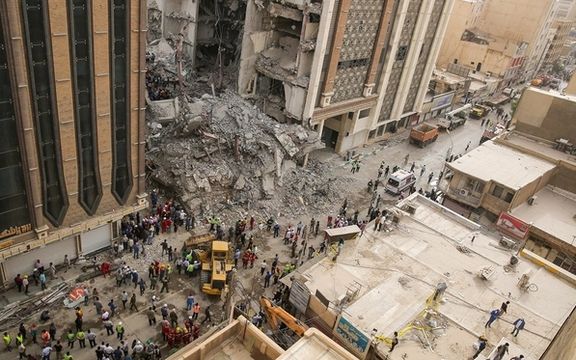
The brother of Hossein Abdolbaghi, whose poorly-constructed building recently collapsed in southern Iran and killed dozens of people, was shot dead by unknown assailants Saturday.
A video from a CCTV camera was released on media showing a car, which apparently was following Majid Abdolbaghi’s vehicle as it went into the parking lot, stopped in front of a building, as one man started shooting with a handgun from the front seat and another one got out of the car and started shooting from behind the car. According to reports Abdolbaghi succumbed to injuries after he was taken to hospital.
The Metropol twin towers collapsed on May 23 burying more than 80 people under the rubble, with about 42 bodies recovered. Soon after the collapse it became apparent that the owner and builder, Hossein Abdolbaghi, was a powerful and politically well-connected businessman who had disregarded regulations and building codes, backed by officials, who might have had their own financial interests.
Following the incident, Iranian media initially reported that Abdolbaghi, who was reportedly connected to Iran’s top security official Ali Shamkhani, had been arrested, but the government later announced that he had died in the collapse. The public did not believe the claim and many said that he escaped and corrupt officials, who had allowed him to violate building regulations, wanted him to disappear.
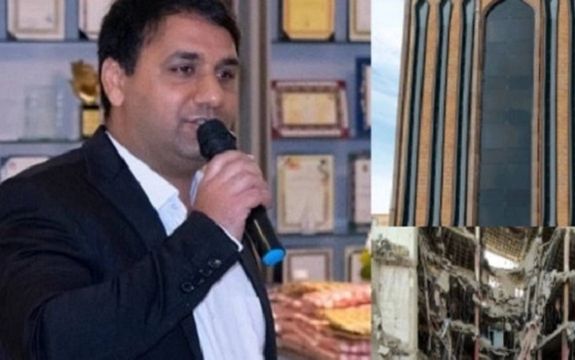
In June, reports came out that a physician who refused to cooperate in the alleged coverup had died mysteriously.
Earlier in the week, Iran’s prosecutor general issued an indictment against 20 people accused in the case of the Metropol incident.